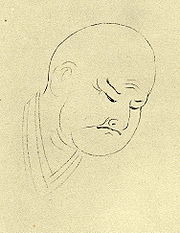Takarai Kikaku

Takarai Kikaku (Japanese: 宝井其角; 1661–1707) also known as Enomoto Kikaku, was a Japanese haikai poet and among the most accomplished disciples of Matsuo Bashō.[1][2]
Early life
[edit]His father was an Edo doctor, but Kikaku chose to become a professional haikai poet rather than follow in his footsteps.[2]
Literary career
[edit]Kikaku set the tone for haikai from Basho death until the time of Yosa Buson in the late 18th century[2] He also left an important historical document, describing Bashō's final days, and the immediate aftermath of his death, which has been translated into English.[3]
Later influence
[edit]In commemoration of the 300th anniversary of Kikaku's death, Nobuyuki Yuasa led an international bilingual (Japanese and English) renku, or collaborative linked poem, which opened with the following hokku by Kikaku:[4]
- 鐘ひとつ賣れぬ日はなし江戸の春
- Springtime in Edo,
- Not a day passes without
- A temple bell sold.
Bashō's criticism
[edit]- Kikaku wrote of coarser subjects than Bashō, and in this respect his poetry was closer to earlier haikai, as well as to senryu,[5] and his master is known to have denigrated Kikaku's 'flippant efforts'.
- Comparing Kikaku's paired haiku in 'The Rustic Haiku Contest', Bashō remarked of one that "these are artifices within a work of art; too much craft has been expended here".[6]
- One day, Kikaku composed a haiku,
- Red dragonfly / break off its wings / Sour cherry
which Bashō changed to,
- Sour cherry / add wings to it / Red dragonfly;
thus saying that poetry should add life to life, not take life away from life.[7][8]
See also
[edit]References
[edit]- ^ Eighteen Haiku by Kikaku, translated by Michael K. Bourdaghs, in Big City Lit, Feb 2004 Archived 2007-07-16 at the Wayback Machine
- ^ a b c Katō, Shūichi and Sanderson, Don. A History of Japanese Literature: From the Man'yōshū to Modern Times,Routledge, 1997, ISBN 978-1-873410-48-6 p.159
- ^ Takarai, Kikaku. An Account of Our Master Basho's Last Days, translated by Nobuyuki Yuasa in Springtime in Edo. Keisuisha, 2006. ISBN 4-87440-920-2, pp.15-26
- ^ Yuasa, Nobuyuki et al. Springtime in Edo. Keisuisha, 2006. ISBN 4-87440-920-2, pp.3-9
- ^ R H Blyth, A History of Haiku Vol I (1963) p. p. 132
- ^ Makoto Ueda, Matsuo Bashō (1982) p. 153
- ^ MBR: Reviewer's Bookwatch, October 2001
- ^ The Conversation Continues – Page 28
External links
[edit]- A selection of Kikaku's haiku translated into English
- Kikaku's An Account of Our Master Basho's Last Days
- Springtime in Edo, the international renku composed in memory of the 300th anniversary of Kikaku's death
